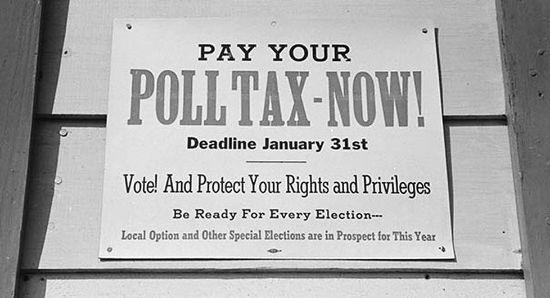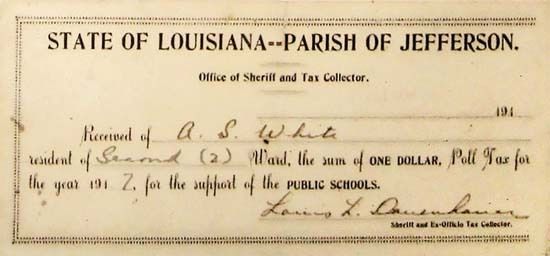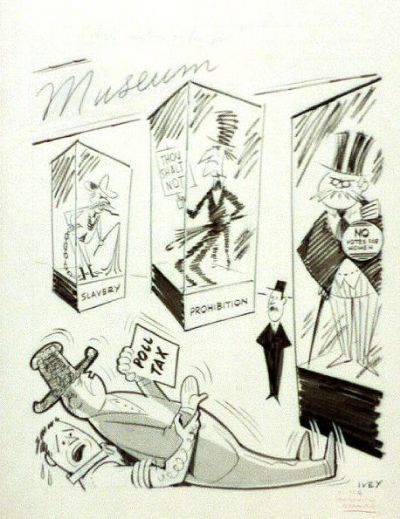Though many people think of Jim Crow as something in our past, along with poll taxes put in place to be a “skin-color” tax to prevent people of a darker hue from voting, it isn’t history. It’s alive and well and being perpetrated across the U.S. and not just in the south.
I was a senior in High School the year that the 24th amendment to the U.S. Constitution was finally ratified. Here we are, 50 years later and the struggle continues.
The Twenty-fourth Amendment (Amendment XXIV) of the United States Constitution prohibits both Congress and the states from conditioning the right to vote in federal elections on payment of a poll tax or other types of tax. The amendment was proposed by Congress to the states on August 27, 1962, and was ratified by the states on January 23, 1964.
Poll taxes appeared in southern states after Reconstruction as a measure to prevent African Americans from voting, and had been held to be constitutional by the Supreme Court of the United States in the 1937 decision Breedlove v. Suttles. At the time of this amendment’s passage, five states still retained a poll tax: Virginia, Alabama, Texas, Arkansas, and Mississippi. The amendment made the poll tax unconstitutional in regard to federal elections. However, it was not until the U.S. Supreme Court ruled 6-3 in Harper v. Virginia Board of Elections (1966) that poll taxes for state elections were unconstitutional because they violated the Equal Protection Clause of the Fourteenth Amendment.
A cartoon titled, “Here’s another one for you” making fun of the poll tax
Poll tax: Pay in cash or in time?
A few years ago, Rachel Maddow made the argument that standing in long lines was a form of poll tax:
Attorney General Eric Holder took a lot of static from the right-wing when he used the “poll tax” words to describe Texas’ voter ID laws, while addressing the NAACP convention in Houston TX, in 2012.
“Under the proposed law, concealed handgun licenses would be acceptable forms of photo ID, but student IDs would not. Many of those without IDs would have to travel great distances to get them, and some would struggle to pay for the documents they might need to obtain them…We call those poll taxes.”
The audience agreed.
Vindication came for Holder, and for us-in the ruling just handed down in Texas:
A Texas-born and raised Latina federal judge, Nelva Gonzalez Ramos, did not just block a Republican-sponsored state voter ID law, she equated it to laws enacted by states after slavery was abolished to ensure blacks could not vote.
“The Court holds that SB 14 creates an unconstitutional burden on the right to vote, has an impermissible discriminatory effect against Hispanics and African-Americans, and was imposed with an unconstitutional discriminatory purpose,” Gonzalez Ramos stated in her lengthy ruling issued Thursday. “The Court further holds that SB 14 constitutes an unconstitutional poll tax.”
After slaves were freed and black Americans began to win elected office, laws requiring black Americans to pay a fee to vote or to pass literacy tests began to be enacted. Similar tactics were used in the Southwest against Mexican Americans.
Texas’ strict voter ID law, passed by the Republican-led Legislature in 2011, only accepts certain forms of photo ID and does not allow other commonly used ones. It does not allow college student photo IDs, for example, but allows gun permits as identification.
As I said, this isn’t just about the south, which was made clear in a case dealing with Wisconsin. U.S. Circuit Judge Richard A. Posner mentioned “poll taxes” in his dissent.
A conservative judge’s devastating take on why voter ID laws are evil
Then there’s the argument that getting a photo ID is easy and cheap, and therefore that people without them must not care enough about voting to bother. The three-judge panel wrote that obtaining a photo ID merely requires people “to scrounge up a birth certificate and stand in line at the office that issues driver’s licenses.” Posner replies that he himself “has never seen his birth certificate and does not know how he would go about ‘scrounging’ it up.” Posner appends a sheaf of documents handed to an applicant seeking a photo ID for whom no birth certificate could be found in state records. It ran to 12 pages.
As for its supposedly negligible cost, “that’s an easy assumption for federal judges to make, since we are given photo IDs by court security free of charge. And we have upper-middle-class salaries. Not everyone is so fortunate.” He cites a study placing the expense of obtaining documentation at $75 to $175 — which even when adjusted for inflation is far higher than “the $1.50 poll tax outlawed by the 24th amendment in 1964.”
Our right to vote is still under attack. The battle to preserve it can’t just be in the courthouses. Each one of us has to vote and get others to do the same.
GOTV!
Cross-posted from Black Kos



11 comments